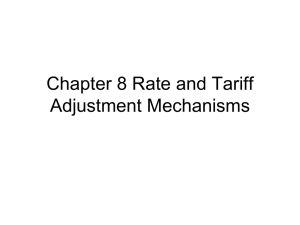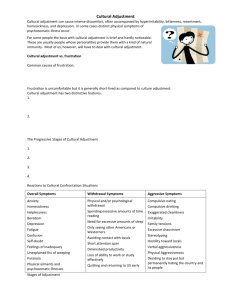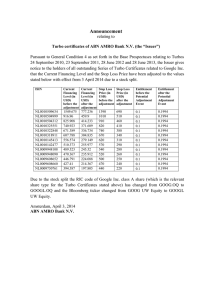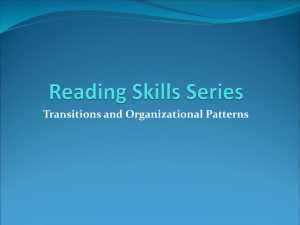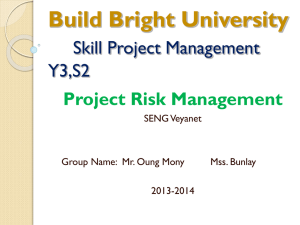transition to kindergarten 2015
advertisement
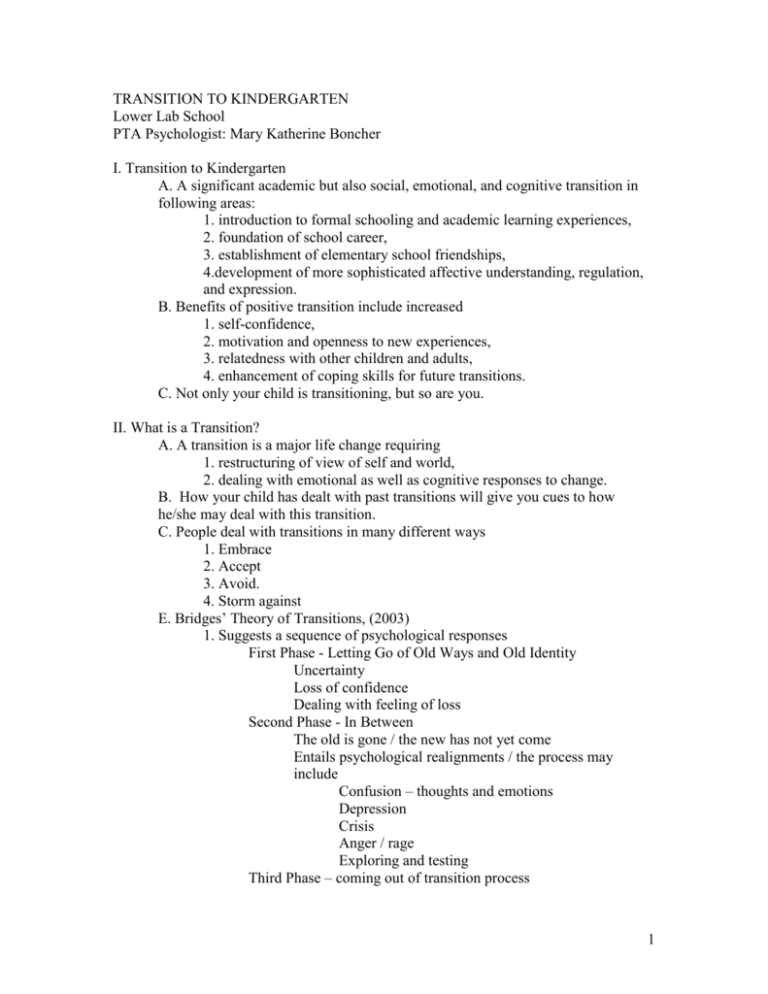
TRANSITION TO KINDERGARTEN Lower Lab School PTA Psychologist: Mary Katherine Boncher I. Transition to Kindergarten A. A significant academic but also social, emotional, and cognitive transition in following areas: 1. introduction to formal schooling and academic learning experiences, 2. foundation of school career, 3. establishment of elementary school friendships, 4.development of more sophisticated affective understanding, regulation, and expression. B. Benefits of positive transition include increased 1. self-confidence, 2. motivation and openness to new experiences, 3. relatedness with other children and adults, 4. enhancement of coping skills for future transitions. C. Not only your child is transitioning, but so are you. II. What is a Transition? A. A transition is a major life change requiring 1. restructuring of view of self and world, 2. dealing with emotional as well as cognitive responses to change. B. How your child has dealt with past transitions will give you cues to how he/she may deal with this transition. C. People deal with transitions in many different ways 1. Embrace 2. Accept 3. Avoid. 4. Storm against E. Bridges’ Theory of Transitions, (2003) 1. Suggests a sequence of psychological responses First Phase - Letting Go of Old Ways and Old Identity Uncertainty Loss of confidence Dealing with feeling of loss Second Phase - In Between The old is gone / the new has not yet come Entails psychological realignments / the process may include Confusion – thoughts and emotions Depression Crisis Anger / rage Exploring and testing Third Phase – coming out of transition process 1 Acceptance New confidence New energy Resolve Purposefulness New sense of identity 2. Transitions can involve grieving for the loss of the old. 3. Transitions often work best - when they are approached intentionally, - when personal challenges entailed are recognized, - when there are supports in place. III. Adjustment to Kindergarten for You and Your Child A. New place, people, situation, rules. 1. Can be both exciting and stressful. 2. Research shows: - parents value social adjustment, - children consider feelings about school and understanding of rules most important. B. Child will be taught and over time expected 1. to function in a larger class setting - take instructions given to a larger group, - ask for clarification when something is not clear, - work more independently, - work in a large group with less reliance on the teacher; 2. to interact with peers - initiate and maintain contact including learning and using names, - respond to peer initiations, - share objects and turns; 3.to play and work - appropriately with peers and alone, - stay with and complete activities within allotted time, - with few individual reminders from adults; 3. to learn and respond to routines - care for personal belongings, - utilize new routines after practice opportunities, - move from one activity to another without individual reminders, - react appropriately to changes in routines; 4. to follow directions - watch others, figure out who has learned something correctly, and imitate or seek help, - answer adults’ questions, - modify behavior when given verbal feedback, - comply with group as well as individual instructions, - respond appropriately to spoken multi-step directions; 5.to follow classroom rules 2 . - separate from parents and accept teacher’s support and authority, - seek teacher’s attention in acceptable ways, - focus attention on speaker, shift attention appropriately and participate in class activities, - sit and listen for brief periods, - wait for brief periods for peers to assemble; 6.to acquire academic skills. C. Adjustment for parents and family 1. Emotionally - recognize child’s adjustment process and needs, - support child’s adjustment, - transfer control and the ability to protect during the school day, - adjust to separation process that movement to K represents, - adjust to child’s new developmental stage; 2. Practically - schedule changes based on school-day hours, - obtain quality care for after school and teacher planning days, - deal with and negotiate decreased accessibility to child and school than in pre-school, develop regular communication with child’s teacher, -make time to be involved in child’s education whether helping with homework or participating in school activities. IV. Adjustment Challenges May Be Manifested by Some Kindergarteners. A. Adjustment issues are normal 1. Up to 21% of kindergarteners experience generalized adjustment difficulties. 2, Up to 50% of kindergarteners exhibit specific adjustment difficulties. B. Manifestations of adjustment difficulties may include Crying Depression Separation anxiety Generalized anxious behaviors Not wanting to go to school or frequent absences Somatic complaints Loss of appetite Nightmares Acting out behaviors Low Self Esteem Low motivation Less classroom participation Difficulty learning Stress symptoms Regressed behaviors. 3 C. These manifestations of adjustment should be attended to, but if short term should not elicit over concern. 1. Talk to child and attempt to understand child’s experiences, and concerns (remember that children in transition need guidance to learn how to negotiate the demands of new environment). 2. Communicate with teacher. 3. Participate in school functions, become part of the fabric of the school. D. If adjustment difficulties persist 1. Request assistance from school guidance counselor. 2. Consult or ask for observation from PTA Psychologist. 3. Seek additional outside help. REFERENCES Athanasiou, M. S. (2006). It takes a village: children’s transition to kindergarten. School Psychology Quarterly, 21(4), 468-473. Bridges, W. (2003). Managing transitions: Making the most of change (2nd ed.). Cambridge, MA: Da Capo Press, Perseus Book Group. Laverick, DeAnna. (2008). Starting school: Welcoming young children and families into Early school experiences. Early Childhood Education Journal 35(321-326) Rimm-Kaufman, S,.E. Pianta, R.C., & Cox, M. J. (2000). Teachers’ judgments of problems in the transition to kindergarten. Early Childhood Research Quarterly, 15, 147-166. Turner, Sherri (2007). Introduction to special issues: Transition Issues for K-16 Students. Professional School Counseling, 10(3) 224-226. 4
